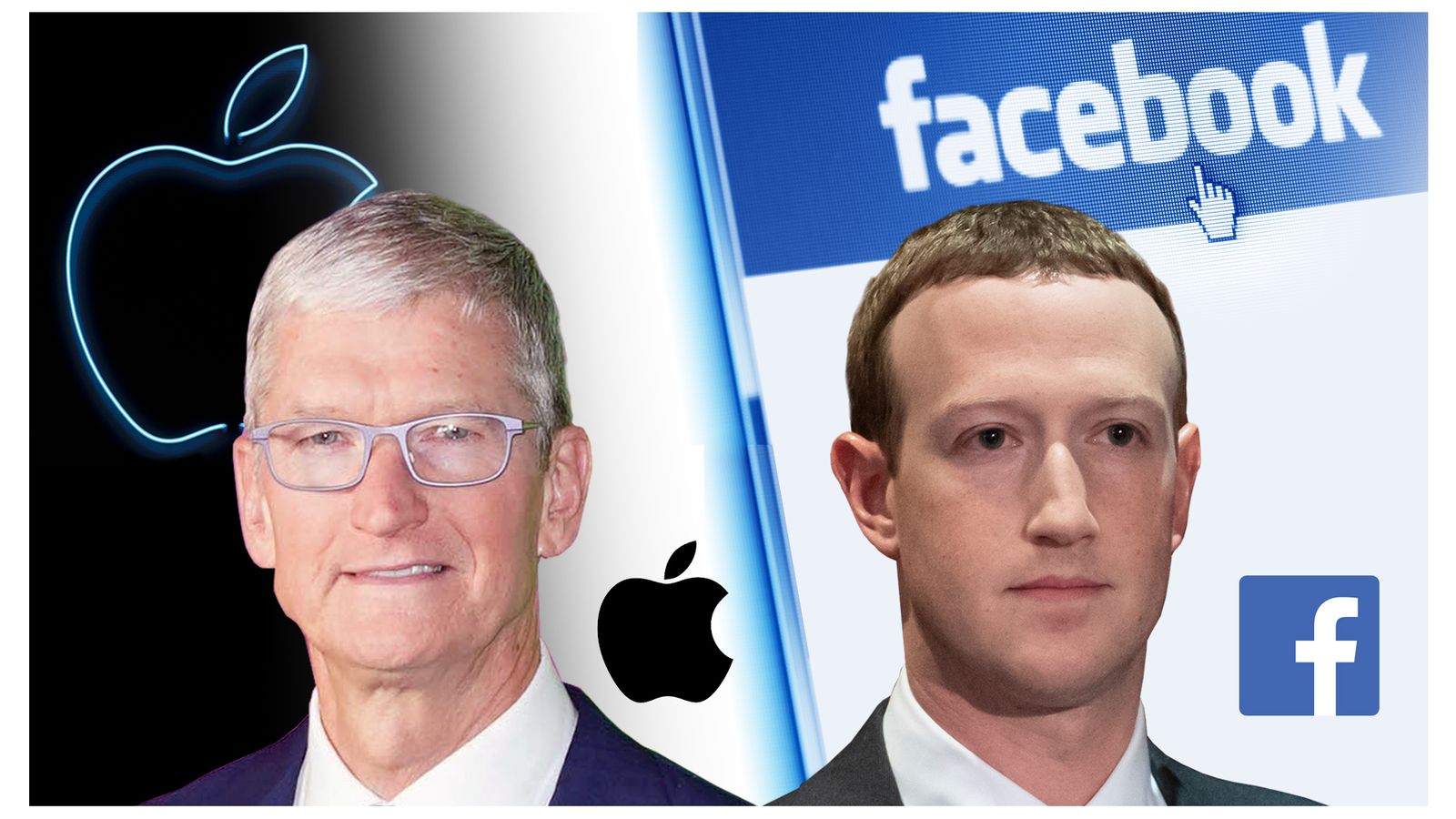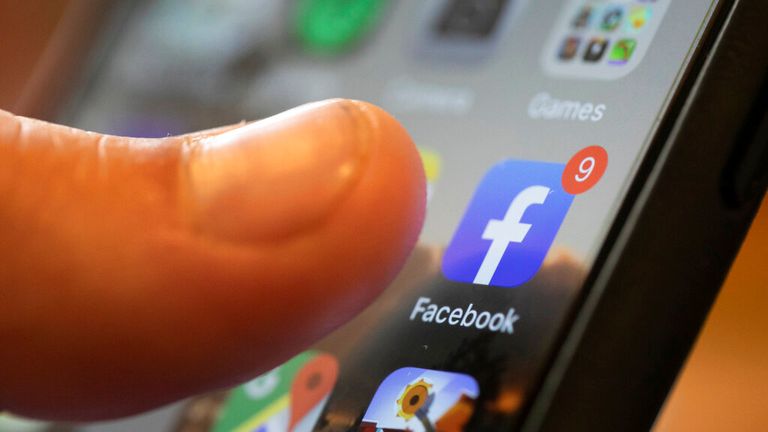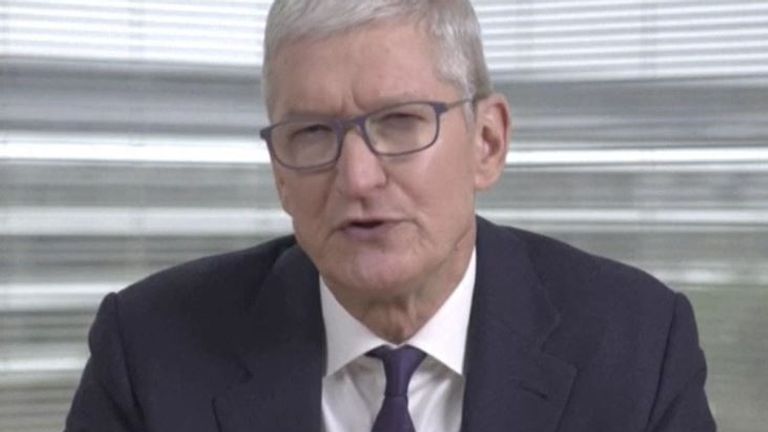Apple and Facebook are on course for a series of clashes as court cases and technological developments pit their business models against each other. The technology industry will be reshaped in the winner’s image.
Despite the looming threat of antitrust action from competition regulators in both the European Union and the United States, both companies – two of the most valuable in the world – appear to view each other as their most prominent threat.
Apple is the most valuable company in the world, worth more than $2.3trn, while Facebook is the world’s seventh most valuable business with a value of $801bn. Although both are constituent members of Big Tech, they aren’t direct competitors who could capture any of each other’s market share.
The majority of Apple’s revenue comes from selling devices, although it is increasingly making money from offering peripheral gadgets and additional services to the people using those devices too.
Facebook is a social networking platform whose revenues are almost entirely generated by advertising. It has no hardware products besides a small range of smart devices designed for video calling – mostly just users and customers who want to reach them with ads.
Despite this, Mark Zuckerberg this week broke protocol by naming a specific rival during a phone call with investors. Explaining the company’s financials and offering forward-looking statements about its growth, Mr Zuckerberg declared that Apple was “one of our biggest competitors”.
In some ways this competition was yet to really come to fruition. Facebook’s chief executive said there was some existing overlap between its WhatsApp messenger – which it plans to add business functions to – and Apple’s iMessage, although the other product lines, such as augmented reality glasses, are yet to be launched.
His exceptional targeting of Apple reportedly comes as Facebook builds its own antitrust lawsuit against the iPhone-maker, according to three people at the company who spoke to NBC News – confirming a report in The Information – which will accuse Apple of using the App Store to suppress competition.
Apple’s chief executive Tim Cook meanwhile has delivered a scathing attack on Facebook, albeit without mentioning the company by name, at a virtual conference in Brussels.
Just weeks after the mob attack at the Capitol building in Washington DC, Mr Cook said: “We can no longer turn a blind eye to a theory of technology that says all engagement is good engagement.
“At a moment of rampant disinformation and conspiracy theories juiced by algorithms… it’s long past time to stop pretending that this approach doesn’t come with a cost – of polarisation, of lost trust and, yes, of violence.”
Part of the issue, said Mr Cook, was that smartphone apps contain too many trackers which “surveil and identify users across apps, watching and recording their behaviour” often without users knowing that this is taking place.
“Technology does not need vast troves of personal data, stitched together across dozens of websites and apps, in order to succeed. Advertising existed and thrived for decades without it. We’re here today because the path of least resistance is rarely the path of wisdom,” he added.
“If a business is built on misleading users, on data exploitation, on choices that are no choices at all, then it does not deserve our praise. It deserves reform.
“Will the future belong to the innovations that make our lives better, more fulfilled and more human? Or will it belong to those tools that prize our attention to the exclusion of everything else, compounding our fears and aggregating extremism, to serve ever-more-invasively-targeted ads over all other ambitions?”
This is the key area of dispute, and the battleground will be Apple’s mobile devices. These are set to include a new App Tracking Transparency (ATT) feature in iOS 14.
This feature will give users what Facebook describes as “a discouraging prompt” if any apps such as Facebook’s attempt to track them or access their device’s advertising identifier.
Facebook claimed the feature would harm app developers and small businesses, and that it was an anti-competitive measure designed to benefit Apple’s own advertising features.
Apple responded by saying it welcomed in-app advertising and was not prohibiting tracking, “simply requiring each app to obtain explicit user consent in order to track so that it will be more transparent and under user control”.
The company has yet to announce a date for the long-awaited ATT feature, but the timeline suggested by Mr Cook indicated it would be likely to rolled out across Apple devices in early spring this year.
Facebook’s criticisms came as the social media company also announced it would be joining Fortnite maker Epic Games’ legal fight against Apple. It said it would be providing relevant information on how Apple’s policies adversely impacted the company.
“Free apps and the entrepreneurs and creators who build them… rely on advertising to make money, and in turn, provide free content to people – from your morning news to the game you play in line at the coffee shop to that comedy show you watched on Friday night,” explained Facebook.
“Apple has every incentive to use their dominant platform position to interfere with how our apps and other apps work, which they regularly do,” Mr Zuckerberg told investors this week. “They say they are doing this to help people, but the moves clearly track their competitive interests.”




